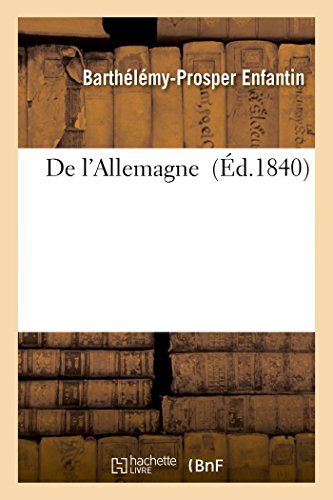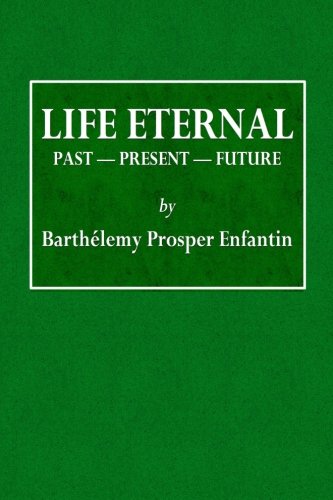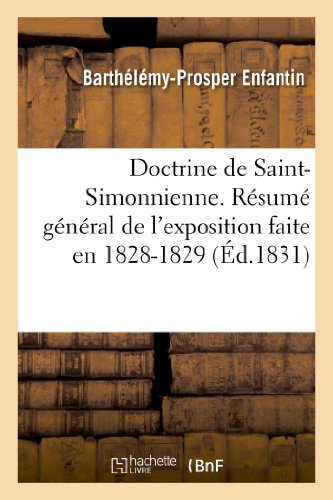Background
Enfantin was born at Paris on the 8th of February 1796. He was the son of a banker of Dauphiny.



(De l'Allemagne / reponse de B.-P. Enfantin a Heine; publ....)
De l'Allemagne / reponse de B.-P. Enfantin a Heine; publ. par M. Duguet Date de l'edition originale: 1840-1850 Sujet de l'ouvrage: Allemagne -- Histoire Ce livre est la reproduction fidele d'une oeuvre publiee avant 1920 et fait partie d'une collection de livres reimprimes a la demande editee par Hachette Livre, dans le cadre d'un partenariat avec la Bibliotheque nationale de France, offrant l'opportunite d'acceder a des ouvrages anciens et souvent rares issus des fonds patrimoniaux de la BnF. Les oeuvres faisant partie de cette collection ont ete numerisees par la BnF et sont presentes sur Gallica, sa bibliotheque numerique. En entreprenant de redonner vie a ces ouvrages au travers d'une collection de livres reimprimes a la demande, nous leur donnons la possibilite de rencontrer un public elargi et participons a la transmission de connaissances et de savoirs parfois difficilement accessibles. Nous avons cherche a concilier la reproduction fidele d'un livre ancien a partir de sa version numerisee avec le souci d'un confort de lecture optimal. Nous esperons que les ouvrages de cette nouvelle collection vous apporteront entiere satisfaction. Pour plus d'informations, rendez-vous sur www.hachettebnf.fr
http://www.amazon.com/gp/product/2013542240/?tag=2022091-20

(Barthélemy Prosper Enfantin, dit aussi Père Enfantin, est...)
Barthélemy Prosper Enfantin, dit aussi Père Enfantin, est né à Paris le 8 février 1796 et mort à Paris le 31 août 1864. Il est l'un des principaux chefs de file du mouvement saint-simonien, mais est aussi un écrivain et un entrepreneur, à l'origine notamment du canal de Suez et du développement du chemin de fer, ainsi que directeur d'un organe de presse.
http://www.amazon.com/gp/product/B00EBZNNOA/?tag=2022091-20

(From the PREFACE. I Address myself more especially to th...)
From the PREFACE. I Address myself more especially to those who imagine they believe in eternal life, though they do not even believe in a past life previous to birth; the result being that, instead of fixing their faith in eternal life, in reality they believe in nothing but a future life following on death. This contradiction with their alleged faith in eternal life, which ought to take into account both the life previous to birth and that following on death, combined with this confusion and identification of the future with the eternal, prevent them from understanding the present life, the bond between the past and the future, and from practising it, as does the man who really believes in that life eternal which includes past, present, and future. I also address myself to those who fervently and legitimately maintain the perpetuation of their individuality or personality, of what they call the future life and the salvation of the soul, forgetting that there neither is nor can be, by the utmost stretch of fancy or imagination, any individuality separate from the environment from which it is ever drawing, and to which it is ever giving, its own life. Consequently, my object is to make people understand and feel that any belief in the perpetuation of the personality, unless it implies belief in the simultaneous perpetuation of the environment in which the personality is living, is nothing more than a fatal abstraction, a selfish dream separating an individual from what he ought to love, man from his fellow-men, being from all that is not IT. I believe in life eternal, i.e. past, present, and future. I believe in the perpetuation of my personality, i.e. both of itself and of the environment which completes its life, and without which it could not be, and so could not perpetuate itself. I believe that what is contains the résumé of what was - its grave - and the germ of what will be - its cradle; and that the progressive union of this résumé and this germ, i.e. of both past and future, constitutes the present life, that which is more specifically designated as life. I believe that all religions antecedent to Christianity were founded on tradition, on the life of the past, the inspirations of ancestors - in a word, on the Father. I believe that Christianity, on the other hand, drew its strength from prophecy, the future life, aspiration towards the new man, towards the Son. I believe that what we now have to do is to unite these two life-springs in the one real consciousness of the present life, which must be the union of past and future lives, the link between tradition and prophecy, the spirit of peace and tolerance that has come to reconcile children to their ancestors, the bond between Father and Son, which Christians have named the Holy Ghost and which consists of the love of every human being for his neighbour, the love of all for God....
http://www.amazon.com/gp/product/1542943213/?tag=2022091-20

(Doctrine de Saint-Simon: exposition, premiere annee, 1828...)
Doctrine de Saint-Simon: exposition, premiere annee, 1828-1829 / par B.-P. Enfantin, Hippolyte Carnot, Henri Fournel et Charles Duveyrier Date de l'edition originale: 1831 Ce livre est la reproduction fidele d'une oeuvre publiee avant 1920 et fait partie d'une collection de livres reimprimes a la demande editee par Hachette Livre, dans le cadre d'un partenariat avec la Bibliotheque nationale de France, offrant l'opportunite d'acceder a des ouvrages anciens et souvent rares issus des fonds patrimoniaux de la BnF. Les oeuvres faisant partie de cette collection ont ete numerisees par la BnF et sont presentes sur Gallica, sa bibliotheque numerique. En entreprenant de redonner vie a ces ouvrages au travers d'une collection de livres reimprimes a la demande, nous leur donnons la possibilite de rencontrer un public elargi et participons a la transmission de connaissances et de savoirs parfois difficilement accessibles. Nous avons cherche a concilier la reproduction fidele d'un livre ancien a partir de sa version numerisee avec le souci d'un confort de lecture optimal. Nous esperons que les ouvrages de cette nouvelle collection vous apporteront entiere satisfaction. Pour plus d'informations, rendez-vous sur www.hachettebnf.fr
http://www.amazon.com/gp/product/2012797792/?tag=2022091-20
Economic theorist reformer political figure
Enfantin was born at Paris on the 8th of February 1796. He was the son of a banker of Dauphiny.
After receiving his early education at a lyceum, was sent in 1813 to the Ecole Poiytechnique. In March 1814 he was one of the band of students who, on the heights of Montmartre and Saint-Chaumont, attempted resistance to the armies of the allies then engaged in the investment of Paris. In consequence of this outbreak of patriotic enthusiasm, the school was soon after closed by Louis XVIII, and the young student was compelled to seek some other career instead of that of the soldier.
He first engaged himself to a country wine merchant, for whom he travelled in Germany, Russia and the Netherlands. In 1821 he entered a banking-house newly established at St Petersburg, but returned two years later to Paris, where he was appointed cashier to the Caisse Hypothecate.
In 1825 a new turn was given to his thoughts and his life by the friendship which he formed with Olinde Rodriguez, who introduced him to Saint-Simon. He embraced the new doctrines with ardour, and by 1829 had become one of the acknowledged heads of the sect.
After the Revolution of 1830 Enfantin resigned his office of cashier, and devoted himself wholly to his cause. Besides contributing to the Globe newspaper, he made appeals to the people by systematic preaching, and organized centres of action in some of the principal cities of France. The headquarters in Paris were removed from the modest rooms in the Rue Taranne, and established in large halls near the Boulevard Italien.
Enfantin and Bazard were proclaimed "Peres Supremes. " This union of the supreme fathers, however, was only nominal. A divergence was already manifest, which rapidly increased to serious difference and dissension. Bazard had devoted himself to political reform, Enfantin to social and moral change; Bazard was organizer and governor, Enfantin was teacher and consoler; the former attracted reverence, the latter love. A hopeless antagonism arose between them, which was widened by Enfantin's announcement of his theory of the relation of man and woman, which would substitute for the "tyranny of marriage" a system of "free love. " Bazard now separated from his colleague, and in his withdrawal was followed by all those whose chief aim was philosophical and political. Enfantin thus became sole "father, " and the few who were chiefly attracted by his religious pretensions and aims still adhered to him. New converts joined them, and Enfantin assumed that his followers in France numbered 40, 000. Meanwhile believers in Enfantin and his new religion were multiplying in all parts of Europe. His extravagances and success at length brought down upon him the hand of the law. Public morality was in peril, and in May 1832 the halls of the new sect were closed by the government, and the father, with some of his followers, appeared before the tribunals. He now retired to his estate at Menilmontant, near Paris, where with forty disciples, all of them men, he continued to carry out his socialistic views. In August of the same year he was again arrested, and on his appearance in court he desired his defence to be undertaken by two women who were with him, alleging that the matter was of special concern to women. This was of course refused. The trial occupied two days and resulted in a verdict of guilty, and a sentence of imprisonment for a year with a small fine. This prosecution finally discredited the new society. Enfantin was released in a few months, and then, accompanied by some of his followers, he went to Egypt. He stayed there two years, and might have entered the service of the viceroy if he would have professed himself, as a few of his friends did, a Mahommedan. On his return to France, a sadder and practically a wiser man, he settled down to very prosaic work. He became first a postmaster near Lyons, and in 1841 was appointed, through the influence of some of his friends who had risen to posts of power, member of a scientific commission on Algeria, which led him to engage in researches concerning North Africa and colonization in general.
Besides his activities as leading member of the St. Simonian movement, Enfantin was also a prolific writer and statesman in his later life.
He played an important role in the economic development of France, being one of the first to advocate the creation of the Crédit Foncier, a government promoted bank that offered capital at reduced interest rates for socially productive activity.
(Barthélemy Prosper Enfantin, dit aussi Père Enfantin, est...)
(Doctrine de Saint-Simon: exposition, premiere annee, 1828...)
(De l'Allemagne / reponse de B.-P. Enfantin a Heine; publ....)
(From the PREFACE. I Address myself more especially to th...)
He wore on his breast a badge with his title of "Pere, " was spoken of by his preachers as " the living law, " declared, and probably believed, himself to be the chosen of God, and sent out emissaries in a quest of a woman predestined to be the "female Messiah, " and the mother of a new Saviour.
The quest was very costly and altogether fruitless. No such woman was discoverable.
He affiliated to Saint-Simon's version of utopian socialism, and soon he had become one of the acknowledged heads of the sec
He was a member of the secret society of the Carbonari.
